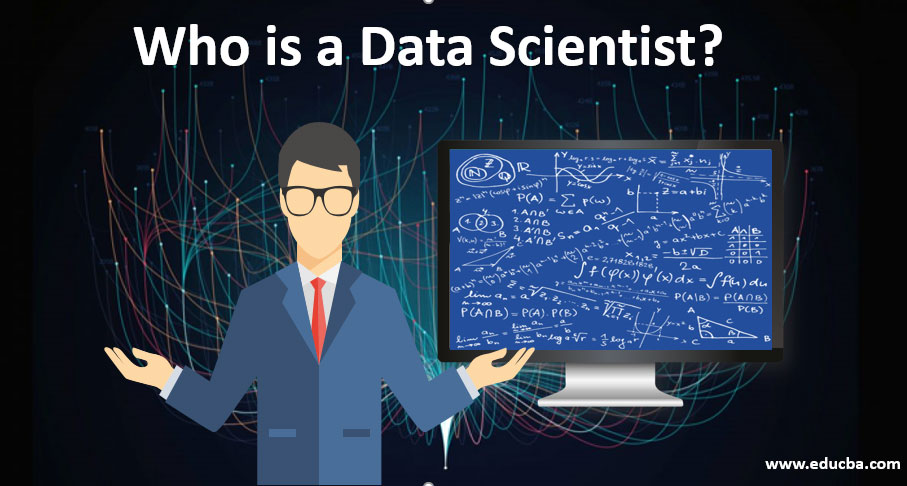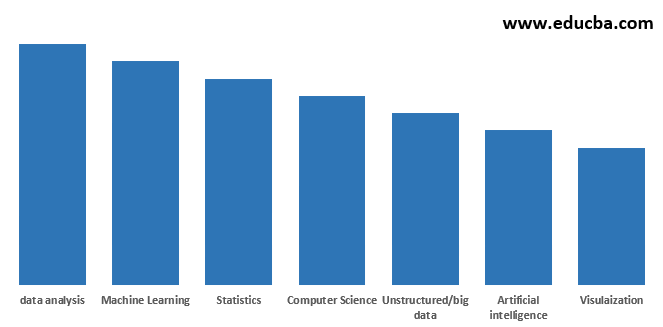Updated May 29, 2023

Introduction to Data Scientist
The following article provides an outline for Who is a Data Scientist? Data Scientists are analytical experts who use technology and social science skills to figure out the pattern and manage the data. These people are good with collecting, enquiring, and analyzing the data to make sense of the unstructured, messy data from various sources such as social media, emails, smart devices, etc. Along with these, they should be good at working with the database, collaborating with other departments to collect data, updating with the latest trends related to the database, etc.
Who is a Data Scientist?
- Data Scientist is a person who works on structured and unstructured data using scientific methods, processes, algorithms, and different systems to extract knowledge and insights. They are analytical data experts with sound technical skills to solve complex business problems, along with an analytical mindset to explore what to solve next.
- You can call them a combination of mathematicians, statisticians, and computer science experts. They have become popular because of the popularity of big data in business. Business is generating a tremendous amount of information in terms of unstructured data, which needs different attention! This field is a gold mine of information, and trusts me; data scientists sit on this goldmine to extract helpful information no one has seen.
- Most data scientists start their careers as statisticians or data analysts. But today, there is a requirement for much more because of the enhancement in big data and Hadoop processing. They are not only responsible for similar kinds of work. One day they might deal with the text mining project; the next day, it could be a predictive model. Hence a data scientist needs to be skilled with varied technologies.
Responsibility for Data Scientist
As a data scientist, you need to be responsible for a few out of many things:
- Collecting raw data from different sources and transforming it into a usable format.
- Finding business problems and solving them with a data-driven approach.
- Proficient in analytical programming languages like R, Python, and SAS.
- Solid statistics knowledge like distribution, hypothesis, etc., for descriptive analysis.
- Knowing in and out of analytical techniques like Machine Learning, Deep Learning, and Text Mining.
- Ability to communicate with technical professionals and end-users to identify and translate business requirements.
- Pattern and trend detection to help business future roadmap.
What Should a Data Scientist Know?
- Data Scientists should know how to handle a data science project from end to end and the technologies behind this to make it happen. For data collection from various sources, data scientists should know basic programming languages like SQL / Python / R or analytical tools like Talend / Pentaho / Spectrum. The knowledge requirement in big data is extremely high now because data is no longer limited to tabular databases.
- Companies use Apache Kafka, Flume, or other analytical tools to extract data from NoSQL databases or through the web. Data Preparation is another huge responsibility for data scientists; hence they need to know data wrangling, data munching, and data mining.
- Data scientists should be well aware of statistics to perform data analysis to understand the patterns and trends from data. They should have an analytical mindset to understand the problem statement and finalize the solution approach. They should have machine learning/deep learning knowledge to apply algorithms to the data. And in the end, they should be able to represent the outcome of the findings through data visualization. For this, they need to know at least one BI tool like Power Bi, Tableau, Qlikview, etc.
Data Scientist Skills
Being a data scientist isn’t a walk in the park. You are expected to be a walking encyclopedia in this domain who knows almost everything that belongs to machine learning, computer science, statistics, mathematics, artificial intelligence, deep learning, visualization, data analysis, and much more! The required skills are quite a niche, and very few people are blessed to have the rightful knowledge. So, let’s try understanding the most in-demand skillset to become a data scientist.
Researchers have found the most in-demand skills, like Statistics, Data Analysis, etc., from the interview platforms like LinkedIn, Indeed, or Glassdoor.
The trend has shown that a data scientist should be very well-versed in Data Analysis to glean insights from the data and should be able to apply machine learning and statistics over the raw data. Data scientists should be aware of either programming language, be it R or Python. For data science, R is preferred, but Python is easy to learn. Advanced Machine Learning, Deep Learning, and Big Data Frameworks are, by default, considered the only cup of tea for data scientists. And at the end, visualization because without storytelling, you are not considered a deserving candidate for a data scientist role.
We can categorize these skills broadly over three domains:
- Statistics / Mathematics
- Business Communication / Leadership
- Computer Science / Programming
1. Statistics
Statistics is a field that focuses on extracting useful information from collected data using statistical measures and formulas. Hence all data scientists need to know in-depth statistics. You need to perform at least a descriptive analysis of any data science project that requires basic concepts like probability, distribution, outliers, etc., which you will learn in statistics. You need to know statistical core concepts like Descriptive statistics, distribution, hypothesis, and regression. Employers will expect you to possess knowledge of the Bayesian probability theory, which encompasses concepts such as conditional probability, prior probability, posterior probability, and maximum likelihood estimation.
2. Business Acumen
Data Scientists are expected to know the business problems of the industry they are working in. They should know which issues are important for business, how to deal with them with the available data, and how these decisions will impact the business. Business awareness is now essential to explore new business opportunities.
3. Programming Language (R/Python/SQL)
Although many statistical tools are available in the market, like SAS, Knime, RapidMiner, etc., knowing at least one analytical programming language makes you headstrong in the mathematics of your operation. You can manipulate data according to your requirements. Python and R are the most used languages by Data Scientists because of the variety of packages available for statistical computations. SQL is an all-time favorite, and no matter which company you are going to, they will test your core SQL knowledge for data science. It is very much required to get the data from the database before starting to use it; hence SQL is also one of the major requirements for becoming a data scientist.
Benefits of Data Scientist in Business
Given below are the benefits of data scientist in business:
- Empowering management and business for better decision-making with data-driven choices.
- Analyzing trends in the organization data and predicting the future based on past trends.
- Selecting critical issues from the pile of problems that matter to the business utmost.
- Figuring new opportunities by digging down the current organizational analytics system.
- Focusing on the rightful target audience to maximize organization growth and revenue.
Conclusion
Yes, becoming Data Scientist is no easy task. But at the same time, it is not impossible! Having the right spirit of learning and being updated would be best. It is the most in-demand position in the market and will be a boom for the next 10 years! So prepare your horses, fill your toolbox with these amazing skills, and make this title yours!
Recommended Articles
This is a guide to Who is a Data Scientist? Here we discuss responsibility, skills, benefits, what a data scientist should know, and a brief explanation of the data scientists. You can also go through our other related articles to learn more –


